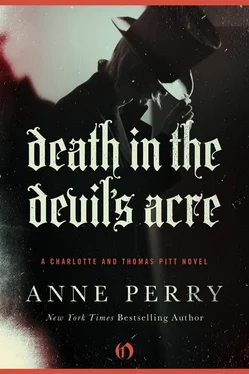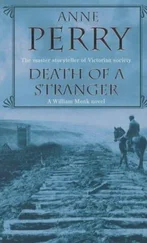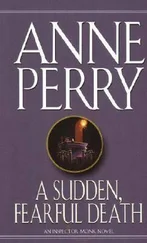Anne Perry - Death in the Devil's Acre
Здесь есть возможность читать онлайн «Anne Perry - Death in the Devil's Acre» весь текст электронной книги совершенно бесплатно (целиком полную версию без сокращений). В некоторых случаях можно слушать аудио, скачать через торрент в формате fb2 и присутствует краткое содержание. Жанр: Исторический детектив, на английском языке. Описание произведения, (предисловие) а так же отзывы посетителей доступны на портале библиотеки ЛибКат.
- Название:Death in the Devil's Acre
- Автор:
- Жанр:
- Год:неизвестен
- ISBN:нет данных
- Рейтинг книги:4 / 5. Голосов: 1
-
Избранное:Добавить в избранное
- Отзывы:
-
Ваша оценка:
- 80
- 1
- 2
- 3
- 4
- 5
Death in the Devil's Acre: краткое содержание, описание и аннотация
Предлагаем к чтению аннотацию, описание, краткое содержание или предисловие (зависит от того, что написал сам автор книги «Death in the Devil's Acre»). Если вы не нашли необходимую информацию о книге — напишите в комментариях, мы постараемся отыскать её.
Death in the Devil's Acre — читать онлайн бесплатно полную книгу (весь текст) целиком
Ниже представлен текст книги, разбитый по страницам. Система сохранения места последней прочитанной страницы, позволяет с удобством читать онлайн бесплатно книгу «Death in the Devil's Acre», без необходимости каждый раз заново искать на чём Вы остановились. Поставьте закладку, и сможете в любой момент перейти на страницу, на которой закончили чтение.
Интервал:
Закладка:
She lifted her chin a little and moved away. “Do you suggest I should look in the Devil’s Acre for a little variety then, Papa?” Her voice was brittle. “I don’t think Alan would care for that! And Mama would be appalled.” She walked over to the bell and pulled it. “I am afraid that, like most other women, I shall just have to put up with a certain tedium and a great deal of trivia in daily life. But I find your moralizing insufferably pompous. You have not the faintest idea what caused these murders, and I can’t think why you want to go on talking about them, unless it is to make yourself feel superior. I don’t care to discuss it anymore. As Mama says, it is unbelievably sordid.”
The bell was answered by the footman.
“Please call my carriage, Stride,” she said coolly. “I am ready to return home.”
Balantyne was filled with a mixture of relief and a sense of loss as he watched her go. Was it the difference between men and women, or one generation and another that set the gulf between their understanding? It seemed these days there were fewer and fewer people he could talk to with ease, and feel that they were discussing something significant, not merely exchanging conventional words that one neither believed in nor cared about.
Why had he wanted to talk about the murders with Christina? Or with anybody? There were a thousand other things to discuss, all pleasant or interesting-even amusing. Why the Devil’s Acre? … Because in remembering some of the things Brandy had spoken of, the poverty and the pain, he could understand the hatred that might drive someone to kill a creature like Max-even if the savage mutilation was beyond his understanding. He would have executed the man, simply, with a shot through the brain. But perhaps, after all, if it were his wife or his daughter Max had used in his whorehouse, he might have felt the need not only to kill but to destroy the offender’s manhood, the means of his power and the symbol of his abuse. There was a kind of justice in it.
He could not put it from his mind. And there was no one with whom he could discuss it without arousing anger or being accused of fatuity and empty moralizing. Was that how his family, the women he loved, saw him? An insensitive man, pompous, obsessed with a series of sordid killings in an area that he knew nothing about?
Surely Charlotte did not see him like that. She had seemed so interested. Could it have been only kindness? He remembered the letters from Wellington’s soldier in Spain, she had affected to find them so exciting. Could that light in her face have been just a politeness? The thought was abhorrent.
He stood up and walked smartly out of the room and across the hallway to the library. He pulled out paper and wrote a letter to Emily Ashworth. She was Charlotte’s sister; she would pass on the message tactfully that the soldier’s letters were available if Charlotte cared to read them for herself. He sent it off with the footman before he had time to reconsider whether he was being foolish.
The following afternoon, at the earliest hour acceptable for calling, the parlormaid came in with a message that Miss Ellison was in the morning room, and did the general wish to receive her?
He felt a rush of excitement boil up inside him, sending the blood into his face. That was ridiculous-she had come to see the letters. It was not personal. She would have come just as quickly, whoever had possessed them.
“Yes.” He swallowed and tried to meet the parlormaid’s eyes quite casually. “By all means. She has come to see some historical documents, so show her into the library, and then bring tea.”
“Yes, sir.” If the parlormaid found it strange, there was nothing in her face to betray it.
He stood up and pulled his jacket a little straighter. Without thinking, he raised his hands to his cravat. It seemed tight. He loosened it a fraction, and made sure in front of the glass that it was properly tied.
Charlotte was in the library. She turned and smiled as the general came in. He did not even notice the warm reds of her street gown, or that her boots were soaked. All he saw was the light in her face.
“Good afternoon, General,” she said quickly. “It is most kind of you to allow me to read the letters. I do hope I have not called inconveniently?”
“No-not at all.” He wished she would use his name, but it would be grossly familiar to ask her to. He must behave with dignity or he would embarrass her. He kept his face cool. “I have no other engagements for the meantime.” He was going to have late tea with Robert Carlton, but that was unimportant; they were old friends and the arrangement was quite informal.
“That is very generous of you.” She was still smiling.
“Please sit down,” he said, indicating the big chair near the fire. “I have asked the maid to bring tea. I hope that is acceptable?”
“Oh, yes, thank you.” She sat down and put her feet on the fender. For the first time, he noticed how wet her boots were, and that they were quite worn. He looked away, and went for the letters out of the bookcase.
They studied them together for half an hour. The maid brought tea, Charlotte poured it, and they returned to the utterly foreign world of Spain at the beginning of the century. The soldier wrote with such intense honesty that they knew his thoughts, felt his emotions, sensed the closeness of other men and the impact of battle, endured with him endless marches over dry hills, his hunger, and the long hours of waiting followed by sudden fear.
At last Charlotte sat back, her eyes wide, seeing far away. “You know, with his writing that soldier has given me a portion of his life. I feel very rich. Most people are restricted to one time and place, and I have been privileged to see another so vividly it is as if I had been there but come away without the injury or the cost.”
He looked at her face, alive with pleasure, and felt ridiculously rewarded. The sense of being alone vanished like night when the whole earth whirls suddenly upward toward the sun.
He found himself smiling back at her. Instinctively he put out his hand and touched her for a moment. The warmth of her spread right through him till his whole body felt it. Then, reluctantly, he withdrew his hand. It was a moment he dared not linger over. The intensity with which he wished to was warning enough.
What could he say that was honest? He would shatter the moment if he were to descend to platitudes, ordinary and born of someone else’s mind. “I’m glad,” he said simply. “It mattered to me, too. I felt as if I knew that soldier better than I know most of the people I see and talk to, and whose lives I thought I understood.”
Her eyes moved away from his and she took a deep breath. He observed the smooth curve of her body, her throat, the fine line of her cheek.
“Merely living close to people does not mean you know them,” she said thoughtfully. “All you know is what they look like.”
Christina came to his mind.
“One tends to believe that other people care about the same things,” she went on. “It comes as a shock to discover sometimes that they don’t. I cannot get the murders in the Devil’s Acre out of my thoughts, and yet most of the people I know prefer not to hear anything about them. The circumstances remind us of poverty and injustices that hurt.” She swung around to look at him, her eyes level. She felt a little embarrassed. “I’m sorry-do you find it unbecoming that I should mention it?”
“I find it offensive and frightening that anyone should be prepared to ignore it,” he said honestly. Would she think him as pompous as Christina did? She could not be more than a few years older than Christina. That was a realization that shot through him with sudden and startling pain. His face flushed and he felt self-conscious. The past hour’s comfort fled. He was being ridiculous.
Читать дальшеИнтервал:
Закладка:
Похожие книги на «Death in the Devil's Acre»
Представляем Вашему вниманию похожие книги на «Death in the Devil's Acre» списком для выбора. Мы отобрали схожую по названию и смыслу литературу в надежде предоставить читателям больше вариантов отыскать новые, интересные, ещё непрочитанные произведения.
Обсуждение, отзывы о книге «Death in the Devil's Acre» и просто собственные мнения читателей. Оставьте ваши комментарии, напишите, что Вы думаете о произведении, его смысле или главных героях. Укажите что конкретно понравилось, а что нет, и почему Вы так считаете.












